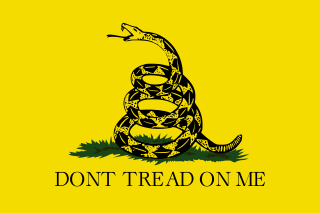Related Research Articles

The Libertarian Party (LP) is a political party in the United States that promotes civil liberties, non-interventionism, laissez-faire capitalism, and limiting the size and scope of government. The party was conceived in August 1971 at meetings in the home of David F. Nolan in Westminster, Colorado, and was officially formed on December 11, 1971, in Colorado Springs. The organizers of the party drew inspiration from the works and ideas of the prominent Austrian school economist Murray Rothbard. The founding of the party was prompted in part due to concerns about the Nixon administration, the Vietnam War, conscription, and the introduction of fiat money.

Libertarians promote individual liberty and seek to minimize the role of the state. The abortion debate is mainly within right-libertarianism between cultural liberals and social conservatives as left-libertarians generally see it as a settled issue regarding individual rights, as they support legal access to abortion as part of what they consider to be a woman's right to control her body and its functions. Religious right and intellectual conservatives have attacked such libertarians for supporting abortion rights, especially after the demise of the Soviet Union led to a greater divide in the conservative movement between libertarians and social conservatives. Libertarian conservatives claim libertarian principles such as the non-aggression principle (NAP) apply to human beings from conception and that the universal right to life applies to fetuses in the womb. Thus, some of those individuals express opposition to legal abortion. According to a 2013 survey, 5.7/10 of American Libertarians oppose making it more difficult for a woman to get an abortion.

The 1982 United States Senate elections were held on November 2, 1982. They were elections for the United States Senate following Republican gains in 1980. The 33 Senate seats of Class 1 were up for election in 1982. A total of four seats changed hands between parties, with Democrats winning seats in New Jersey and New Mexico, and Republicans taking seats in Nevada and the seat of the lone independent, Senator Harry Byrd Jr., in Virginia. Democrats made a net gain of one seat bringing them to 46 seats, while Republicans stayed at 54 seats for a majority. However, the Democratic gain in New Jersey replaced a Republican that had been appointed earlier in the year.
In American politics, a Libertarian Republican is a politician or Republican Party member who has advocated Libertarian policies while typically voting for and being involved with the Republican Party.
The Fully Informed Jury Association (FIJA) is a United States national jury education organization, incorporated in the state of Montana as a 501(c)(3) not-for-profit organization. It works to educate citizens on their authority when they serve as jurors. FIJA's stated aims are to educate the public, provide commentary on current jury-related cases, and assist defendants with jury authority strategies — including the right to veto bad laws and the misapplication of laws by refusing to convict the defendant. The organization was formed in 1989 by Larry Dodge, a Montana businessman, and his friend Don Doig. It was formed following discussions about forming such a group at the National Libertarian Party convention in Philadelphia in 1989.

Lawrence "Larry" W. Reed, also known as Larry Reed, is president emeritus of the Foundation for Economic Education (FEE), where he has served as the Humphreys Family Senior Fellow since May 2019. Before joining FEE, Reed served as president of the Mackinac Center for Public Policy, a Midland, Michigan-based free-market think tank. To date, he remains Mackinac's president emeritus.

Adam Charles Kokesh is an American libertarian political activist, radio host, and author. He was a U.S. 2020 Libertarian presidential candidate running on the single-issue platform of an "orderly dissolution of the federal government."

Scott Avery Boman is an American Libertarian politician from Michigan. He has consistently earned among the top votes of any third-party candidate in every Michigan election from 2000 through 2018. He was chair of the Libertarian Party of Michigan in 2006. Described by MIRS as a Libertarian Party standard-bearer, he has been a candidate in every state-wide partisan election since 1994, until successfully running for the Detroit office of Community Advisory Council in 2020.
The Montana Libertarian Party is the Montana affiliate of the Libertarian Party. In 2012, Mike Fellows made history by becoming the first Libertarian in national LP history to achieve 40 percent in a partisan statewide race.
In the United States, jury nullification occurs when a jury in a criminal case reaches a verdict contrary to the weight of evidence, sometimes because of a disagreement with the relevant law. It has its origins in colonial America under British law. The American jury draws its power of nullification from its right to render a general verdict in criminal trials, the inability of criminal courts to direct a verdict no matter how strong the evidence, the Fifth Amendment's Double Jeopardy Clause, which prohibits the appeal of an acquittal, and the fact that jurors cannot be punished for the verdict they return.
The National Conservative Political Action Committee, based in Alexandria, Virginia, was a New Right political action committee in the United States that was a major contributor to the ascendancy of conservative Republicans in the early 1980s, including the election of Ronald Reagan as President, and that innovated the use of independent expenditures to circumvent campaign finance restrictions.
William Copeland Dodge was an American lawyer and Democratic politician in New York City, New York, United States. He was an associate of the Tammany Hall political organization in the city.

The Ron Paul presidential campaign of 1988 began in early 1987 when former Congressman Ron Paul of Texas announced his candidacy for the 1988 presidential nomination of the Libertarian Party. He joined the third party after leaving the Republican Party over the Reagan administration's handling of the federal budget. He ran on a platform that included non-interventionism in foreign conflicts, decriminalization of illegal drugs on a federal level, a return to the gold standard, the abolition of the Federal Reserve and a reduction in all government spending.
This article contains lists of official and potential third party and independent candidates associated with the 1996 United States presidential election.

The 2016 Libertarian National Convention was the gathering at which delegates of the Libertarian Party chose the party's nominees for president and vice president in the 2016 national election. The party selected Gary Johnson, a former Governor of New Mexico, as its presidential candidate, with Bill Weld, a former Governor of Massachusetts as his running mate. The convention was held from May 26–30, 2016, in Orlando, Florida.

The 1982 United States Senate election in Montana took place on November 2, 1982. Incumbent United States Senator John Melcher, who was first elected to the Senate in 1976, opted to run for re-election. He won the Democratic primary after he faced a tough intraparty challenger, and advanced to the general election, where he faced Larry R. Williams, an author and the Republican nominee, and Larry Dodge, the Libertarian nominee. Though his margin was reduced significantly from his initial election, Melcher still comfortably won re-election to his second and final term in the Senate.
Michael Charles Fellows was an American political activist and Army reservist. He was also a state coordinator for the Montana Fully Informed Jury Association. In the 1990s he issued a press release calling for the impeachment of Bill Clinton. Fellows made political history in 2012 by becoming the first Libertarian candidate ever to gather more than 40% of the vote in a partisan statewide race.
Don Doig is the co-founder of the non-profit group Fully Informed Jury Association in Montana, which was set up to inform Americans about their rights as jurors as well as personal liberties. He was the national coordinator for the organization. He is associated with the Jefferson River Coalition. He is also a former Libertarian Party candidate. He also wrote He Who Pays the Piper: Federal Funding Of Research, and was an associate policy analyst at the Cato Institute.

Austin Wade Petersen is an American writer, political activist, commentator, and broadcaster. He is the host of the Wake Up America show daily newscast. He was the runner-up for the Libertarian Party's nomination for President of the United States in 2016, finishing second place to Gary Johnson with 21.9% of the vote.
References
- 1 2 The Dallas Morning News Aug. 17, 2012 Dr. Lawrence Burnham Dodge Obituary
- 1 2 3 Libertarian Republican Tuesday, April 24, 2012 Larry Dodge in intensive care in Panama City by Clifford F. Thies
- ↑ Missoulian October 03, 2012 Dr. Lawrence Burnham Dodge
- ↑ New York Times April 11, 2006 Retirement, Moving On – Content to Watch Bananas Grow, More Retirees Relocate to Panama By Bob Tedechi
- ↑ New York Times February 13, 2005 National Perspectives: Beauty and Tax Breaks Lure Buyers to Panama by Alex Markels
- ↑ Focus Panama Here in Panama where life is good Some profiles on our new neighbors – Larry Dodge and Honey Sue Lanham
- ↑ Ballot Access News August 15, 2012 Larry Dodge Dies by Richard Winger
- ↑ The Dallas Morning News August 17, 2012 Dr. Lawrence Burnham Dodge Obituary
- ↑ The Washington Post Monday, February 8, 1999 Page A1 In Jury Rooms, Form of Civil Protest Grows By Joan Biskupic
- ↑ Essays on Foundations of American Constitutional Government: "... by the constitution" By Robert D. Gorgoglione Page 504
- ↑ The Michigan Libertarian Newsletter Summer 1985 Vol. 12 No. 5-8 Page 1 National Convention: "Freedom Reborn and the Second Wave"
- ↑ Libertarian Party of Michigan http://www.michiganlp.org/Past%20Newsletters/Michigan%20Libertarian%20Vol%2012.5-8%201985%20Summer.pdf Archived 2015-12-15 at the Wayback Machine
- ↑ The Eris Society Eris 1999 – Aspen, Colorado Archived 2015-03-04 at the Wayback Machine
- ↑ GOA 16 January 2002 Amazing Disgrace: Assault on Juries and the Bill of Rights ...
- ↑ The Day December 14, 1999 D4 Nation New Mexica county ordered to use non-English speaking jurors by Jordan Koidin Associated Press Writer
- ↑ Punishment, Participatory Democracy, and the Jury By Albert W. Dzur Page 132 The Citizen-Activist Movement of the Fully Informed Jury Association (FIJA)
- ↑ The Spokesman-Review Friday Nov. 9, 1984 Page 12 Libertarians retain ballot status
- ↑ ABA Journal Jul 1991 Page 18 Poower to the Juries
- ↑ Spokesman-Review Sep 5, 1984 Page 16, Montana Libertarians seek success, not agreement By Larry Wills Staff correspondent
- ↑ Lewiston Journal Oct-4, 1982 Page 6, The answer really came easy
- ↑ Spokesman-Review Oct 20, 1982 Senate seat candidates trade jobs
- ↑ Reason, 10.22.2012 – Russell Means, R.I.P. – Brian Doherty